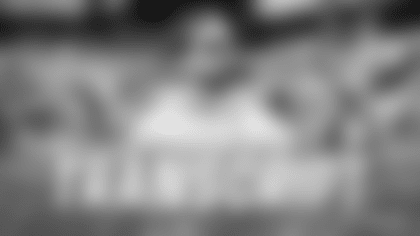Read the full transcript from Head Coach Mike McDaniel's press conference on September 12, 2025.
(Do you expect to have WR Jaylen Waddle available Sunday despite the shoulder?) – "I do."
Q: And with RB Jaylen Wright, would it seem likely that you give that more time before throwing him back in there?
"Likely but not 100%. But likely."
Q: Are you ruling OL Austin Jackson and TE Darren Waller out?
"They'll be out for this week."
Q: What about DT Benito Jones?
"Yes, Benito (Jones) as well."
Q: It was said there was a players only meeting with the players. What's been the energy as they're getting ready for the home opener and what are you seeing as the leaders start to step up?
"I think player-led meetings are important. I think the gravity of this one in particular – it's something that we'd done in the offseason – it is a part of how we do things based upon my beliefs and what maximizes investment is ownership. I think it's important that players feel they have the ability and the desire to do that so that fires me up but in terms of – I think it's a little blown out of proportion with regard to necessity with the whole framework of an NFL season. It feels a lot different than 0-1 based on how we lost and there's natural things with that, that those guys wanted to make sure everyone was on the same page and moving in the same direction. But that being said, you also have to have the sanity of recognizing, OK, you are 0-1; it's one game and we have 16 guaranteed ones left so we need to get our ducks in a row and make sure that what happened before doesn't happen again. So I was happy with that, but I was more happy with the way guys approached their jobs connected throughout the week."
Q: Just a quick follow-up on that. Is there a sense of urgency to not fall 0-2 in the season? There is a random stat that everything statistically and numbers-wise are like less than 20 percent of teams that go 0-2 don't make the playoffs. Do you guys add an extra level of urgency to try to get a win at home?
"I think guys are human beings. Guys put a lot of work into the team and we didn't collectively show it at all Week 1, so that's urgency enough. I think not delivering on a product that you take pride in, in extreme fashion; that's all the motivation that you need. I think it's important to keep a balance in the NFL season as the haymakers of opponents and problems that you have to solve come and you have to have a supreme focus at the team that you're playing and a lot of times, if you start thinking about a ton of other scenarios and 0-2 or the things you brought up, what's lost are the details on the opponent that you're playing that doesn't care about any of those things. So we have a division opponent that we have been versing ourselves in that we have a lot of history with the team and they have a new complexion so we've been diligent about that and we'll continue on our third day of practice today."
Q: How often are these players-only meetings occurring in your tenure? Because I remember them being a thing last year and just didn't gain as much attention as this one.
"I think every year there's been some to some degree. I think it's important that the leaders of the locker room have a voice that's heard and one of the ways that can do that is isolate the players in the room and have a very transparent conversation. I think those things, they've been a part of really all the teams that I've been on that I can remember and it's important that when you have those – I didn't even ask what was going on in the meeting, didn't really care. I knew I was going to be at practice and I'd see how people responded and regardless whether or not they responded to my team meeting or the player-led meeting or whatever; I wanted to see a unified effort on the practice field moving forward and we've had two days of that. So was it the chicken or the egg, team meeting, player meeting; regardless we had stuff to get done and we're in the process of doing that."
Q: I know obviously you're trying to find ways to give the offense a spark. Without obviously talking anything about Sunday game planning of course, going up-tempo, having a faster tempo – is that something you've given thought to? Do you think no huddle, rapid pace could be something that would work with this group?
"That's something that's always been a part of our offense. It's all good until I think last game we had two up-tempo turnovers, so the correlation-causation, it's something that we work on and we'll use to our advantage when we see fit. There's always pluses and minuses to anything. I think up tempo offsets some of our motion so that's good, but regardless, plays are plays and you're going to have to be responsible with the ball to win football games so we'll be focused on both huddle and tempo plays, protecting the ball and doing right by the team and that will be how we get a win, nothing else."
Q: Can you explain what you mean by "tempo offsets some of our motions?"
"If you go no huddle, you're typically not motioning if you go to the line of scrimmage. I would say that inherently, tempo adds non-motion plays and snap counts adjustments because you're not at the line of scrimmage moving one or two players which it can make your motions more powerful if you're trying to keep the defense off-balance and henceforth, tempo – you're getting to the line of scrimmage and you have to adjust to how they play. With that, you have different form of communication. It's a different set of challenges, but we've always done it. I think the most we ever did it was probably Pittsburgh 2022, that game we did it a bunch. Some games we do it a lot. Some games we kind of back off of it. It just depends on the problems that we're trying to solve."
Q: And the main reason or motivation to go up-tempo is to keep their personnel on the field?
"Yes, sometimes you can avoid – it's old hat, but you avoid complex rush patterns and personnels which can be a motivation when you keep your group on and go from no huddle from second down to third down. There's times that maybe you think the defense is just out of shape. Maybe you think that they struggle communicating when they don't have more time between snaps. There's also a component where some centers have no problem live-speed making a huddle call from the line like that off of one or two words. Some don't. I think 'Brew' (Aaron Brewer), it's a strength of his so it gives us reason to, but it's something we always have in our back pocket that we game plan each week. Sometimes we use it, sometimes we don't, but that's been our offense since I want to say we put it in, in 2013 when we had Robert Griffin III and then obviously Chip Kelly came right around then and tempo was in the National Football League."
Q: How have you seen CB Jack Jones and CB Rasul Douglas grow since their respective arrivals?
"I've seen some veteran players recognize the opportunity and go above and beyond. They've just learned a lot and have been upstairs in coaches' offices a ton to bridge the gap from OTAs and stuff. I think as well as there's been a ton of communication from the locker room downstairs, from position room to position room; Minkah (Fitzpatrick) has been heavily involved in getting them sped up, everybody has. You are one-eleventh or two-elevenths of the entirety of the defense and for a successful play, for anyone to make a play on a play, the other ten need to be tied to you. It's everybody's benefit to be on the same page and that's something that has been a supreme focus in our attempt to have 11 people moving in a coordinated fashion against the opponent on Sunday."
Q: Out of the guys who are nursing injuries that might keep them out multiple weeks – are any of them being considered, strongly considered, for IR?
"Yeah, we consider if you have a player – it's injury timelines and you're trying to figure out, 'OK, you can benefit your roster if that injury is concretely four weeks or beyond.' So yeah, we consider all of the injuries. What you don't want to do is put someone on IR and then find out a half week later that they could've been back two games before that. You're measuring the inexact science of medicine or whatever and you're trying to figure out if you can help your roster in the short term or if that's going to hurt you and particularly that player. I struggle robbing players of the finite opportunity of playing in NFL games, so it's easier when you have some absolute certainty. That's where we usually make that move."
Q: I wanted to ask you your opinion or viewpoint on size molds in the NFL. I know you have a seemingly fascination with speed, fast players. Sometimes that impacts the size of those players because five of six of your wide receivers are 5'10" or under. Where does your approach to size, because you do come from Denver, an organization where you guys usually add smaller, more athletic offensive linemen?
"It's an interesting question because I can say that has evolved over time. You come into the business and you learn. I think it was pretty trendy; there was a lot of teams when I first got into the National Football League that some scouting departments were cutting receivers off at 5'10'. If you were below, they didn't want to mess with you. Like you said or you referenced, smaller offensive linemen because you think they have to be a certain way that you're used to. As time has gone on and the different situations I've been in, it's expanded a lot more. I've been a lot more open-minded to speed, size, different discrepancies, because there's a lot of different types of players that are successful. I'm less rigid in the starting point absolutes, which is probably 10 years ago, I probably don't see Patrick Paul as a fit maybe, but then you learn techniques, fundamentals and overtime you adapt to different players who, 'OK, well maybe their 10 is super quick, so all the sudden they can get done what we need to get done.' I hadn't really had 'short' receivers until 2014 in Cleveland when I was a receivers coach and I think our tallest receiver was 5'10". You learn the pros and cons of them having speed, but it does put accuracy pressure on the quarterback just from a range standpoint unless they are every good at creating separation. Then if you're further separated from a defender, the range, your catch radius, isn't as important. I think one thing for me is I try to adapt and I don't like if other teams can find ways for a player to be successful that we can't. Over time, I've become more open-minded but a little more rigid on concrete variables I wouldn't say at the podium that kind of lead us to players. I just want football players. Malik (Washington), we have short, I guess relatively, 'Reek' (Tyreek Hill) and (Jaylen) Waddle aren't that tall. Last year when we were in the sixth round, it wasn't like I was scouring for another short receiver, we wanted the best football player. Then you adapt if it fits to your team and the skill sets of your quarterback and all those things. It's very compounded but a steadily evolving process, and I would say over the last, specifically last 10 years, right when I was in Cleveland, Atlanta, it's changed from the time before that."
Q: What do you think forced that change in the last 10 years? Is it just a style of how teams are playing the game or?
"That's a little bit, then you come across these players that you're like, 'Yeah he can't do it because of this,' and then he does it. You kind of have to open your mind, 'All right well, why did this occur? What did I miss? I thought this guy was too slow. Oh, but his hands are super elite and his vision is super elite.' Like Anquan Boldin, he comes out and you're like, 'Too slow,' and then you see his skill set with how he runs through the ball and you start to say, 'Well if you are running a 40 that's slow, your hands better be elite because you have to be able to maintain separation through the catch by not slowing down.' A lot of guys slow down to catch the football, so only the guys with the real elite hands can stay on the move. All things, it's problem solving, the league has changed. I see body types adjusting for the shell defense, for sure, in the secondary. The 185-pound safety is a lot more prevalent than when I first got in the league. You see smaller edge rushers that have traits that they can hold the point, but in pass rush situations they can play. There's a lot of different ones. Offensive line, we've gone far away from that rigid, small, must have under a 5.2 40(-yard dash) and you had to have a certain level of quickness. But then your run game would be awesome but your pockets would be compromised so then you'd adjust over time. The NFL is about evolution and the game is the same but the principles and how people play it is always evolving. A fun part of it is adjusting to the different things and utilizing people with different skillsets."
Q: What makes the Mike Vrabel's team so tough to beat?
"I think he does a great job of unifying the team to play with absolute strain. They always play hard, I think they're always three phases of effort. I think his system defensively, for sure, is built from Bill (Belichick) in the New England days, but he has his own kind of vision on it, and it's unified and it's connected. I think that's the standard that he held in Tennessee and that he's carried over in a short time with New England. It's just that they're a well-coached team that plays very hard. They seem to play for each other, which I think speaks to the type of culture he creates."
Q: After the loss, you said not good enough. As you guys get ready for the final practice for week for the Patriots, how are you communicating that accountability to the locker room without letting the confidence dip?
"I try to stay as connected to facts as I can for my opinions. I have open eyes and am very responsive to their actions. The main thing is on a football team you have to have connected people that respond to each other. Right, wrong or indifferent, let's say I say whatever the voice is and the direction that we're going, it's the right thing if everyone is going in that direction. If I say as a coordinated unit, we need to do something – if the leaders I see them respond and all the players respond to them, that's how you have football teams move as one. That response element and whatever it is – a lot of times we overcook situations and try to immediately label them as good or bad, and then over time we're like, man whatever thing I thought was good ended up hurting us or vice versa. The bottom line is I'm just trying to see people respond to me and to each other. I think they've done that thus far two-thirds through the week and that's what I'm looking forward to again today. I'm not measuring against yesterday's work or tomorrow's work. It's quite literally today and only today, and then I'm just relentless with that approach because I think that's how real action gets done."
Q: I wanted to ask you about coaches that have intimate knowledge of other coaches. Defensive Coordinator Anthony Weaver worked under Head Coach Mike Vrabel, was part of his staff. Does his knowledge of Vrabel get vetted?
"They're not all the same. There's some times the knowledge is surface level, there's some times that it is deeper than that. There is a lot of guys on the team that have working relationships, coaches and players, with Coach Vrabel. I think it helps to a point to paint a picture to the team of this is probably how you're being viewed and how they're going to attack us and this is why. I think it's helpful. At the same time, most of the time if it's really good information, it matches the tape. Realistically, it doesn't matter how much you know about someone in preparation if you can't match the gall or exceed it in practice with the information. It can be helpful I think with Coach Vrabel, the guys that have been around him kind of know his consistent speed. It is good and empowering to the players when you can kind of illustrate the plan of action from them and then you can kind of teach yours. But at the same time, it only goes so far because I can tell the team that, 'Hey, Coach Vrabel is going to make sure that these dudes play hard.' Then they're like 'OK, they're going to play hard.' Well you have to take your technique, fundamentals, assignment and match or exceed how they play regardless. It can be helpful to a point, but it's not the end all."














